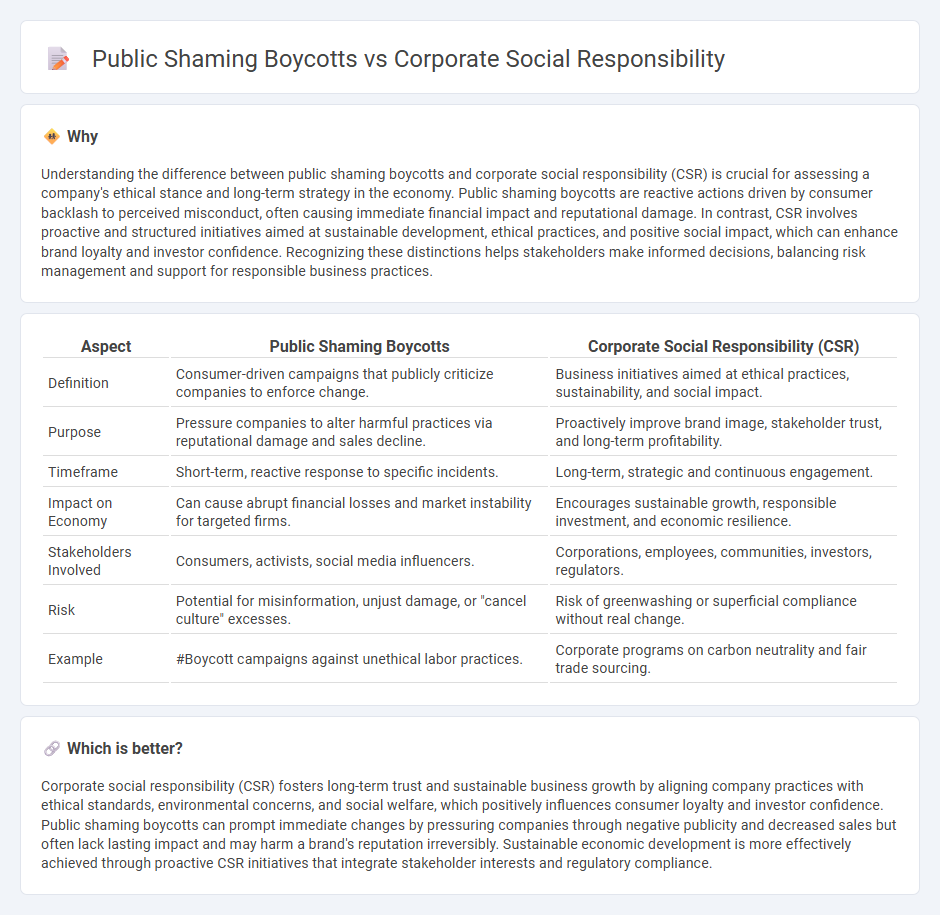
Public shaming boycotts serve as direct consumer actions targeting companies accused of unethical behavior, aiming to pressure immediate change through reputational damage. Corporate social responsibility (CSR) represents a strategic approach where businesses proactively integrate ethical practices into operations to foster long-term sustainability and stakeholder trust. Explore how these contrasting mechanisms influence economic outcomes and shape corporate behavior in today's global market.
Why it is important
Understanding the difference between public shaming boycotts and corporate social responsibility (CSR) is crucial for assessing a company's ethical stance and long-term strategy in the economy. Public shaming boycotts are reactive actions driven by consumer backlash to perceived misconduct, often causing immediate financial impact and reputational damage. In contrast, CSR involves proactive and structured initiatives aimed at sustainable development, ethical practices, and positive social impact, which can enhance brand loyalty and investor confidence. Recognizing these distinctions helps stakeholders make informed decisions, balancing risk management and support for responsible business practices.
Comparison Table
| Aspect | Public Shaming Boycotts | Corporate Social Responsibility (CSR) |
|---|---|---|
| Definition | Consumer-driven campaigns that publicly criticize companies to enforce change. | Business initiatives aimed at ethical practices, sustainability, and social impact. |
| Purpose | Pressure companies to alter harmful practices via reputational damage and sales decline. | Proactively improve brand image, stakeholder trust, and long-term profitability. |
| Timeframe | Short-term, reactive response to specific incidents. | Long-term, strategic and continuous engagement. |
| Impact on Economy | Can cause abrupt financial losses and market instability for targeted firms. | Encourages sustainable growth, responsible investment, and economic resilience. |
| Stakeholders Involved | Consumers, activists, social media influencers. | Corporations, employees, communities, investors, regulators. |
| Risk | Potential for misinformation, unjust damage, or "cancel culture" excesses. | Risk of greenwashing or superficial compliance without real change. |
| Example | #Boycott campaigns against unethical labor practices. | Corporate programs on carbon neutrality and fair trade sourcing. |
Which is better?
Corporate social responsibility (CSR) fosters long-term trust and sustainable business growth by aligning company practices with ethical standards, environmental concerns, and social welfare, which positively influences consumer loyalty and investor confidence. Public shaming boycotts can prompt immediate changes by pressuring companies through negative publicity and decreased sales but often lack lasting impact and may harm a brand's reputation irreversibly. Sustainable economic development is more effectively achieved through proactive CSR initiatives that integrate stakeholder interests and regulatory compliance.
Connection
Public shaming boycotts drive corporations to enhance their social responsibility efforts by pressuring them to address unethical practices and align with consumer values. Corporate social responsibility initiatives mitigate reputational risks and prevent financial losses triggered by widespread consumer backlash in boycotts. These dynamics create a feedback loop where heightened public accountability compels businesses to adopt sustainable and ethical economic practices.
Key Terms
Stakeholder Engagement
Corporate social responsibility (CSR) emphasizes proactive stakeholder engagement by integrating ethical practices and transparency into business operations, fostering trust and long-term relationships with customers, employees, investors, and communities. Public shaming boycotts act as reactive measures driven by stakeholder activism, directly impacting brand reputation and financial performance through collective consumer and social media pressure. Explore how strategic stakeholder engagement in CSR can mitigate risks associated with public shaming boycotts and enhance corporate resilience.
Reputational Risk
Corporate social responsibility (CSR) mitigates reputational risk by proactively aligning business practices with ethical standards and stakeholder expectations. Public shaming boycotts rapidly amplify reputational damage through widespread social media exposure and consumer mobilization, often forcing immediate corporate response. Explore effective strategies to balance CSR initiatives with crisis management in the face of boycott threats.
Consumer Activism
Corporate social responsibility (CSR) engages companies in ethical practices, sustainability, and social impact initiatives to build brand trust and loyalty among consumers. Public shaming boycotts leverage social media to rapidly mobilize consumer activism, pressuring corporations to change controversial behaviors or policies through reputational risk. Explore how consumer activism shapes corporate accountability and impacts business strategies in evolving markets.
Source and External Links
What is Corporate Social Responsibility (CSR)? Guide & Examples - Corporate social responsibility (CSR) refers to a company's voluntary efforts to improve society through philanthropy, ethical practices, environmental initiatives, and social justice, aiming to create positive social value beyond profit.
Corporate social responsibility - Wikipedia - CSR is a form of private business self-regulation that contributes to societal goals via ethical business practices, philanthropy, and community engagement, evolving from voluntary actions to sometimes mandatory schemes influenced by laws and standards.
What Is Corporate Social Responsibility (CSR)? - CSR as a management concept ensures companies operate ethically and benefit society, with examples including Google's sustainability goals, LEGO's recycling programs, and Starbucks' ethical sourcing and community investments.
 dowidth.com
dowidth.com